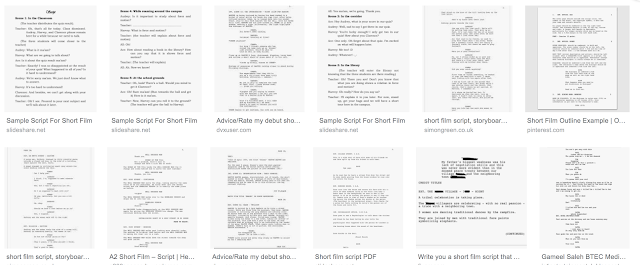RIGMAROLE SCRIPT
MAIN CHARACTER MONOLOGUE –
I would say I had a pretty
normal childhood, two parents, a bed to sleep every night, movies to watch,
videogames to play. I started noticing that I didn’t care about anybody else, I
noticed this when my dog had died, and I witnessed somebody drown, and I
started playing videogames all day and all night until I finally need some sleep.
I started to enjoy watching animals
and plants all fighting to be at the top, the few that are. Nature documentaries
are the best. I believe natural selection is vital in our society, to pick out
the weak and reward the elite, eventually only the best will remain, similar to
how lions can easily pray on zebras and antelopes.
Rigmarole…
It now means some lengthy and
complicated procedure, but an older sense was of an incoherent set of
statements or a wandering discourse — I shall try to avoid any such tedious
tale, but the history of this word is more than a little odd and takes some
recounting. In medieval times, there was a game called ragman, which seems to
have been like consequences but with predefined statements. It used a rolled-up
scroll containing descriptions of characters, each with a string attached.
Players selected a string at random, the scroll was then unrolled, and the
associated passage read out, to the hilarity of all present (these were
obviously simpler times).
They scream. Blocked by a
strip of plastic with an adhesive surface, used for sealing, binding, or
attaching items together.
There are also some
suspicions that the same system was used for a gambling game. The origin of the
name for the game is obscure: the oldest form was Rageman, said as three
syllables, and this suggests it may have been French in origin — a character
called Rageman the Good appeared in some French verses of about 1290. Others
think it might have come from rag in the sense of tatters, used as a name for a
devil (as in ragamuffin, originally a demon).
The name was transferred to
various English statutes at the end of the thirteenth century, which were
written on scrolls. With the seals and ribbons of their signers sticking out,
these reminded people of the scroll used in the game. The most famous such
document was the one in 1291 in which the Scottish nobility and gentry
subscribed allegiance to Edward I before John Balliol took the Scots throne. It
seems the terms ragman and ragman roll passed into the language as a
description of a long and rambling discourse, no doubt from the disconnected
nature of documents like the rolls of allegiance.
It later seems to have fallen
out of use; it reappeared in the eighteenth century in various spellings, such
as riggmon-rowle, but it eventually settled down as rigmarole, in the process
losing any clear connection with the older term. As it resurfaced in writing as
rigmarole, with the meaning “a succession of confused, meaningless, or foolish
statements.” In the mid-19th century rigmarole acquired its most
recent sense, “a complex and ritualistic procedure”.
Life.
Life can be a lengthy,
complex, complicated and sometimes ritualistic procedure. Life can be unfair,
but the elite are always rewarded.

Comments
Post a Comment